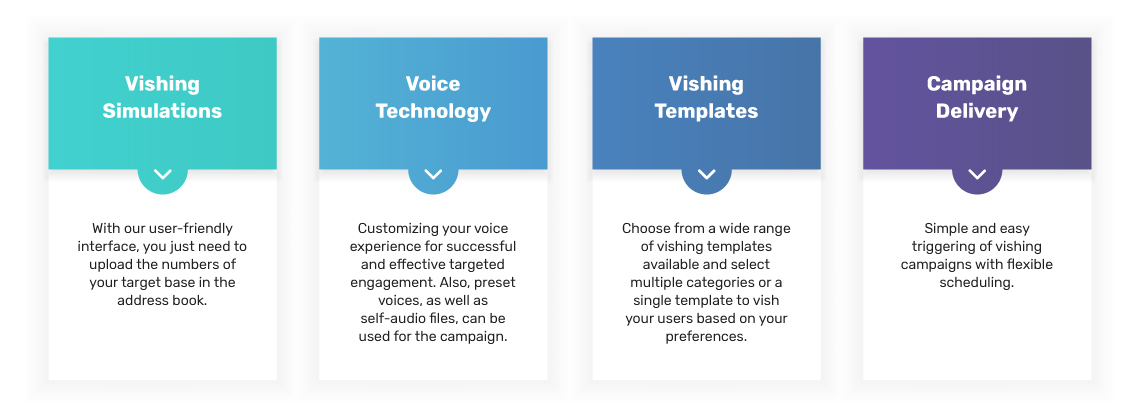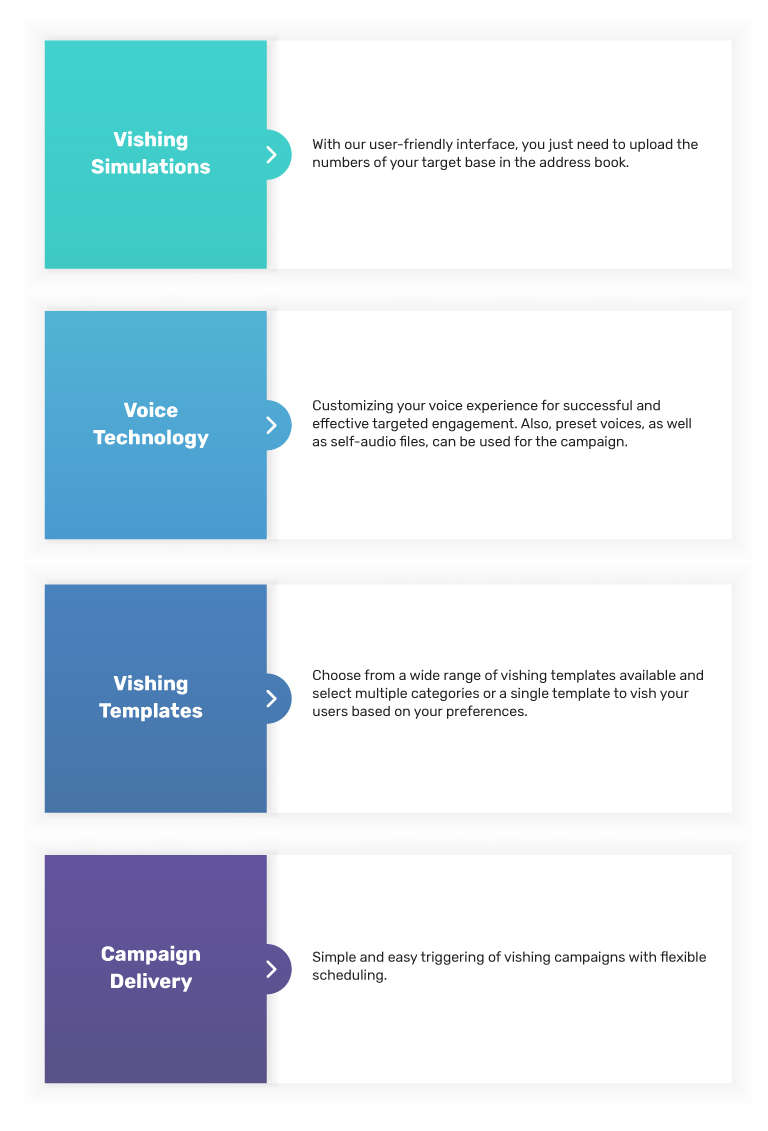Vishing
Internet pirates target human psychology to manipulate and steal digital data. They use social engineering attacks, such as phishing, vishing, and more to gain unauthorized access. While phishing is a fraudulent attempt by hackers to lure a person into divulging their sensitive data through emails, instant messages, and text messages, vishing takes place when attackers trick victims into giving up sensitive information over the phone. In light of such threats, organizations across the globe are using different security solutions to strengthen their first line of cyber defense.
With the increasing use of technology in the United States and other countries, people are now more susceptible to falling into cyber traps. While phishing shows no signs of slowing down anytime soon and is only continuing to evolve in sophistication and effectiveness, vishing attacks have also witnessed a spike over the last year. The increase in cases can be attributed to the COVID-19 pandemic, due to which a majority of the workforce shifted to telework. This shift also marked a rise in the use of virtual private networks (VPN), thus eliminated the in-person verification process.
What Is Vishing?
Vishing (voice phishing) is a type of social engineering attack which uses voice technology. Unlike other phishing attacks, such as email phishing and SMiShing, that use emails and text messages, respectively, vishing is a call-based attack. It tricks potential victims into revealing their sensitive and financial information such as account numbers, PINs, passwords, and more by impersonating a call from an authorized bank or a legitimate organization.
Under vishing, threat actors use fake caller IDs to appear legitimate (such as your bank or your office), looking to encourage victims to divulge sensitive information. Attackers can ask for information like credit/debit card details, personal information, username & password, OTP (One Time Password), and bank account details. They can then use this information to install malicious software on your PC to monitor your online activities and steal data. As many services in the United States and other countries use automated callers (also known as robocall or bot caller) to lessen the burden on customer relations, this technology can also, for worse, be used as part of a voice phishing scam.

With continuous developments in technology, hackers have also ramped up their game. The use of artificial intelligence (AI) has made some jaw-dropping advances in the attack surface. There have been reports of security incidents that involved the use of AI to impersonate trusted individuals to phish potential victims.
Vishing is also sometimes followed by other phishing attacks. For example, you click on a link for an ad that piques your curiosity. Unfortunately, you find that your system has been infected with ransomware or other malware that makes you believe that your system has been compromised and requires an expert’s help immediately. You see a number which you call to remediate the problem. In most cases, the contact is a threat actor who was also responsible for your system’s current condition. Thus, the threat actor will scam your money successfully.
Aware provides phishing simulations that imitate real-life attack scenarios that teach your employees to spot phishing scams and evade the hefty cost of data breaches.
Why Do You Need to Act Against Vishing?
- Studies have reported a sharp rise in phishing activities in the year 2019, which are expected to grow between 2020-21.
- In the year 2018, nearly 30% of calls were reported as spam and vishing.
- With nearly 71% of cyberattacks being financially motivated, hackers target companies and organizations capable of paying more than any individual.
- Almost 43% of breaches involve small-scale businesses and industries, which contrasts with the general assumption that only large organizations are susceptible to phishing attacks.
- Humans are the weakest link in the cybersecurity chain and more vulnerable to social engineering attacks, with nearly 33% of reported breaches involved in social engineering methods.
- Vishing attacks resulted in a loss of around $450 million since 2014.
The statistics show that small, medium, and large-scale businesses are equally susceptible to the increasing potential of social engineering attacks.
How to Defend Against Vishing?
To defend against vishing attacks in the United States, begin with the right simulation exercises and awareness training to enhance your staff’s security awareness regarding such security issues. To achieve this, Aware Vishing Simulations are designed to test your employees in the same way a cybercriminal would. Our vishing solutions improve your employees’ understanding of the dangers of vishing.
Prominent Features of Aware
Along with testing and training, Aware also offers additional features based on your requirements, such as the scale of operations, campaign statistics, etc.
- Learning Management (LMS Integrations)
- Learning Management System with Autoenroll
- Priority Level Support
- Support Resources and Email Support
- Email and Phone Support
- Dedicated Consultant Support
- Customer Support
- Active Directory Support
- Multiple Language Support
- Real-Time Visible Training Results
- Campaigns Summary
- Unified Dashboard
- Advanced Reporting
- Reporting APIs
- Branded Reports
- Print & Export Reports
- Basic Reporting
- Reporting and Analytics
- Board of Directors Report
- Editable Executive Report (Word doc)
- Preset Template Library
- Customizable Template Library
- Template Creation
- Professional Template Services
- Active Phishing Threat Templates
- Education Templates
- Multiple Template Campaigns
- Schedule Real-Time Email Alerts for Campaigns
- Automated Training Campaigns
- Outlook Plugin to Report Suspicious Email
- Advanced API Integration
- Mail Server/LDAP Integration
- Active Directory Integration
- Office 365 Integration
- Exchange On-Premises Integration
- Outlook & Office Integration
- OWA Plugin
- Google Apps Integration
- Gmail Plugin
- Mobile Integration
- Priority Level Support
- Support Resources and Email Support
- Email and Phone Support
- Dedicated Consultant Support
- Customer Support
- Active Directory Support
- Multiple Language Support
- Unlimited Phishing Simulations
- Schedule Features
- Website Cloning Tool
- Industry Benchmarking
- Vishing Security Test
- SMS/Text Phishing Simulations
- Smart Groups
- Security Roles
- USB Drive Test
- Educational Content Library
- Administrative Features
- MSP Account Management
- Professional Services
- CBT Modules
- Advanced Theme Selector
- Automated Playbooks
- Advanced Analytics
- Mobile Responsive Modules
- Credentials - Data Entry
- Password Capture
- Attachments in Phishing Template
- Pre-Launch Test
- Preset Landing Page Templates
- Customizable Landing Pages
- Reporting KPIs
- Click Rate
- Opened Messages
- No Response
- Campaign History
- Repeat Offenders
- Deployment
- On-Prem
- SaaS
- Hybrid
Frequently Asked Questions
Ans. As with any cybersecurity service, the cost of Aware security solutions differs based on the following set of variables:
- The scale of an organization.
- Security understanding of the users and employees.
- The current security infrastructure.
- The risk and liability associated with the business process.
Getting phished has become too familiar these days, and only the right solution or prevention can help you. Awareness about phishing is something that can really help organizations and individuals from preventing data loss. A FREE Phishing Simulation DEMO can help you understand.
That is what we are here for! All you need to do is contact us and discuss your requirement for the right guidance.

